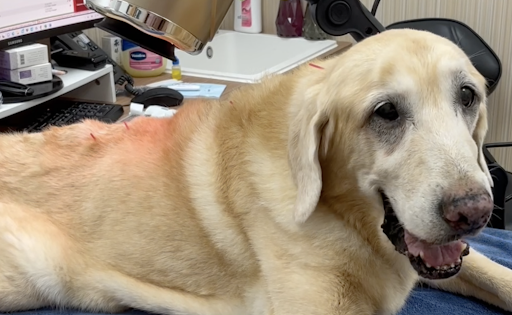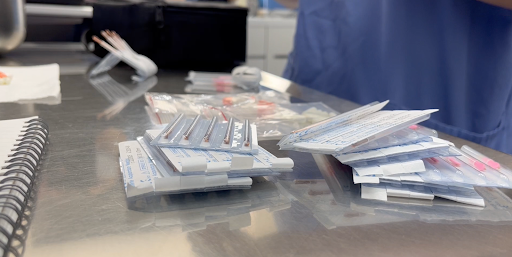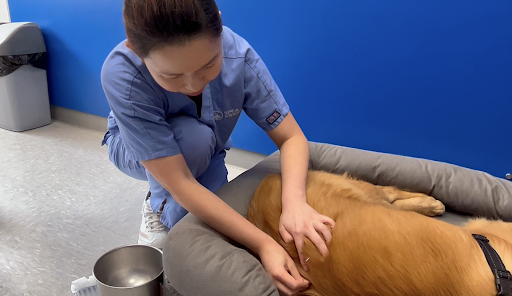Some Hong Kong pet owners choose Traditional Chinese Veterinary Medicine (TCVM) as an alternative practice to treat their pets.
By Liam Hordijk
Karen Wong Hoi-lun has taken her 13-year-old Labrador Wang Wang for Chinese herbs to treat its endocrine disorder – a hormone imbalance – for about two years since the problem began.
“His issues were serious, as Wang Wang could not digest food well and his stool was unusual,” she recalls.
Her pet has also had arthritis for around seven years, which has seen improvement since starting acupuncture treatments also two years ago.
“After the Chinese medicine treatments, Wang Wang’s stomach and intestines recovered, and he has become more energetic and seems more willing to walk. I really believe Chinese medicine methods [for pets] can help. I hope they will become more popular in the future,” she says.
The clinic she goes to offers both Western and Traditional Chinese medicine treatments for animals. Wong says that she has sought both for her dog in the past, but she believes long-term issues are better addressed with Chinese medicine.

“Western medicine would only prescribe diarrhoea medicine and probiotics, which I do not believe can help the dog in the long run,” she says.
“I really believe Chinese medicine methods can help. I hope they will become more popular in the future,”
But some pet owners like Eric Lam Yu-wing, owner of 7-month-old cat Molly, are not fully sold on Chinese medicine treatment for pets.
“My cat has been less playful and having some appetite issues lately. She has not been eating much. I’m open to her getting Chinese medicine, but first I’d like to see if there’s any research on the efficacy of these treatments,” he says.
Lam’s cat was diagnosed with Feline Infectious Peritonitis last March, a disease with symptoms that include fever and weight loss, for which he was told no Chinese medicine solution exists. Instead, Molly would receive antiviral injections.
Studies have been conducted to assess Chinese veterinary medicine treatments and suggest effectiveness in treating issues like storm phobia and even oral cancer when used at the same time as conventional treatments.
But the evidence regarding the efficacy of acupuncture was deemed not “compelling” in the past, according to a 2006 study published by the Journal of Internal Veterinary Medicine. Outside of the evidence being limited to warranting “further investigation”, the “methodological quality” of “[past] trials” was also criticised as “low”.
The Chinese medicine experience
Having employed Chinese medicine on pets for over four years, Dr. Ronnie Tong Long-ning says that he has faced scepticism about his work. But he adds that people are often more convinced of Chinese medicine for pets after several treatments and seeing their pet’s health improve.
Tong says that the most common service he provides to pets is acupuncture, and that acupoints for humans and animals are “quite similar”.

But he adds that a big difference in treating a pet instead of a human is communication.
“The pet cannot speak, so if they have some really minor problem[s] they cannot tell the vet,” he says.
The diagnosis process includes measuring the animal’s pulse, looking at its tongue, and going over its medical history and available test results. Then the treatment is agreed upon between a pet owner and the vet.
Tong says that he feels proud of his work for how it can help animals when other means cannot.
These include a cat that had undergone urethral unblocking surgery three times by the time it was two years old for its recurring urethral blockage.
“Then I tried [treating the cat with] some herbal medicine and acupuncture, and I think for almost two years it has not had the blockage again,” he says.
He adds that one appeal of Chinese medicine for pets is the relatively low costs.
“The cost [of a spinal surgery] is maybe more than HK $100,000 (US $12,700). For the acupuncture it’s around HK $500 (US $63.7) to HK $1000 (US $127) for each treatment,” he says, but adds that the cost of a herbal medicine regimen depends on the case.
Low-risk and ubiquitous
Spokesperson and vet for the Society for the Prevention of Cruelty to Animals (SPCA) Dr. Anita Young Hau-yee says that Chinese veterinary medicine treatments are safe as knowledge of acupoint locations and herbal medicine dosage has been “gradually refined” over time.
She adds that the treatments are tailor-made for each animal.
“The needle lengths and thickness we choose depend on the size of the animal. They are designed to be safe even if the animal moves [during treatment]. The concentration [of Chinese medicine herbs] we use is based on the weights of patients,” she says.

Young adds that acupuncture does not prescribe additional medication that will conflict with the pet’s existing conditions, a major concern especially when treating older animals.
She points out that the average age of Hong Kong’s pet population has increased, partially explaining the increase in popularity of Chinese medicine for pets.
“In Hong Kong there are pets now living well above 10 years of age, so when they start to have chronic illnesses or mobility problems, owners will start to explore new methods,” she says.
Chinese veterinary medicine can also diagnose and treat mild signs of illness that Western medicine cannot, such as restlessness.
Young also adds that there is supply to match the demand, and many certified vets here offer acupuncture service and hold the necessary qualification – a certificate accredited by the United States-based International Veterinary Acupuncture Society (IVAS) – to practise it.
Chinese medicine can complement Western medicine, according to Young.
She highlights a case where one of her patients – a cat already taking all the Western medication for seizures – following acupuncture and herbal medicine treatments, has had its frequency of seizures reduced from a few times a week to once every few months.
“We do acupuncture and Chinese herbs for cases where we’re just supplementing or tonifying,” she says.
But she adds that Chinese medicine has its limits as it cannot address emergency cases or ones that need surgical correction.
Edited by Yap Ying Ye
Sub-edited by Phoebe Chu







































